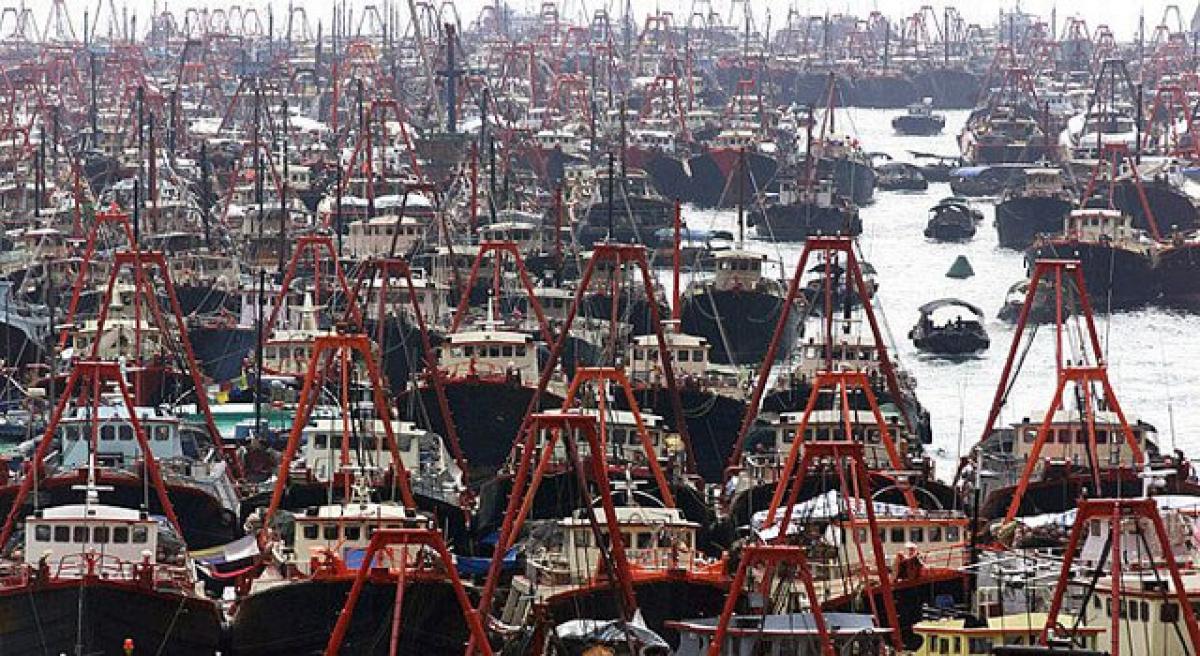Live
- NASA Tracks Five Giant Asteroids on Close Approach to Earth Today
- Pushpa 2 Hits ₹1000 Crore in 6 Days: How It Compares to Other Top Indian Films
- Vivo X200 and X200 Pro Launched in India: Price, Specifications, and Features
- Nitin Gadkari Admits Feeling Embarrassed at Global Summits Over Rising Road Accidents in India
- Opposition Slams ‘One Nation, One Election’ Bill as Anti-Democratic; BJP Allies Support the Move
- Celebrate Karthigai Maha Deepam Virtually with Sri Mandir’s LIVE Darshan Experience
- BJP Extends Support to Samagra Shiksha Abhiyan Employees' Strike, Demands Immediate Regularization and Welfare Benefits
- Dr. M. Priyanka Stresses Quality Education, Nutritious Meals, and Cleanliness in Schools
- Mandal Level CM Cup Sports Concludes in Ija with Promising Talent and Enthusiastic Participation
- Harish Rao Slams Revanth Reddy: "More Talk, Less Action"
Just In

The first ever UN Ocean Conference came to a close on June 9 with a \"Call For Action,\" over 1,300 voluntary commitments made to support ocean health, and aspirations for a new convention to protect biodiversity in the roughly half of our planet which lies beyond national jurisdictions.
The first ever UN Ocean Conference came to a close on June 9 with a "Call For Action," over 1,300 voluntary commitments made to support ocean health, and aspirations for a new convention to protect biodiversity in the roughly half of our planet which lies beyond national jurisdictions.
The commitments range from vague policy intentions to declarations of marine protected areas extending for millions of square kilometres. Many of these conservation zones are being set up by small island developing states whose fate in a world being altered by climate change was the subject of much attention at the conference.
Efforts to staunch the massive flow of plastic pollution into the seas, one of the most visible signs of the oceans' decline, were another major point of emphasis. The threat of micro-plastics to human health, as small beads used in cosmetics and other industries end up being ingested by marine life and passed up the food chain, received particular attention.
Considered to be the largest such gathering for the oceans ever convened, the Ocean Conference that took place at the UN headquarters in New York was designed to boost support for Sustainable Development Goal 14 (SDG14), which lays out ambitious targets to conserve and sustainably use marine resources.
"SDG14 is arguably the most ambitious of the goals, with targets not just for the year 2030, but also 2020 and 2025," explained Andrew Hudson, head of Ocean and Water Governance for the UN Development Programme (UNDP). "We're supposed to go from 30 per cent of global fish stocks being overfished down to zero per cent by 2020. That's a six per cent decrease every year from 2015.
Has that been happening?"
The answer is almost certainly no, and underlying the conference was a general concern that progress on this sustainable development goal has been lagging. The commitments made at the conference will help, but they're non-binding. The treaty negotiations over rules that will govern the oceans in the future instead are taking place outside the conference. Notably, global delegates are due to gather in New York next month to decide whether to pursue an international agreement on managing the high seas: Roughly 70 per cent of the oceans – nearly half the world's surface area – lie beyond national jurisdiction.
Heralded by Sir Richard Branson and Leonardo DiCaprio – two of the many celebrities who participated in the week's ocean-related festivities – as a potential "Paris Agreement for the Ocean," formal negotiations on this Biodiversity Beyond National Jurisdictions (BBNJ) agreement would take place under the UN Convention of the Law of the Sea (UNCLOS), according to Lisa Speer of the Natural Resources Defense Council.
"We began talking about a high seas convention about 10 years ago," said Speer. A convention would try to coordinate and sustainably manage all kinds of activities on the high seas – not just fishing, but mining, energy development, even carbon sequestration efforts – to try and maintain the immense biodiversity found in the oceans.”
The real question, noted observers, is likely to be the position of the US. With the start of the UN Ocean Conference overshadowed by the Trump administration's announcement of its intention to leave the Paris Agreement on climate change, no one seems sure how it will engage in ocean-related treaty talks.
Although the US is not signatory to UNCLOS, explained Speer, it can participate in the negotiation of implementing agreements under the convention, and has already signed another such agreement (on fisheries management). US officials, like those from China, kept a low profile at the UN Ocean Conference, which was co-hosted by Sweden and Fiji.
A brief statement made by a US official at the conference plenary emphasised the need, and the country's efforts, to fight illegal, unreported and unregulated (IUU) fishing and lauded the recent entry into force of another treaty, the FAO Port States Agreement, which requires signatory parties to prevent vessels from landing illegally caught fishing products in port.
The UNDP's Hudson, meanwhile, lauded another convention recently agreed to which will set rules for the disposal of ballast water from ships, a major vector for the introduction of invasive species. The other major ocean-related negotiations currently under discussion are the subsidies that governments provide to fishing fleets, which critics say have been spurring over-fishing and illegal activities on the high seas.
It's estimated that the fisheries industry benefits from $35 billion in subsidies every year, most of which are considered to be "harmful", including fuel subsidies for China's distant water fishing fleet. But these talks are being carried out under the auspices of the World Trade Organisation, and will be the focus at a ministerial meeting in Buenos Aires in December. (In arrangement with thethirdpole.net)
By James Fahn

© 2024 Hyderabad Media House Limited/The Hans India. All rights reserved. Powered by hocalwire.com







